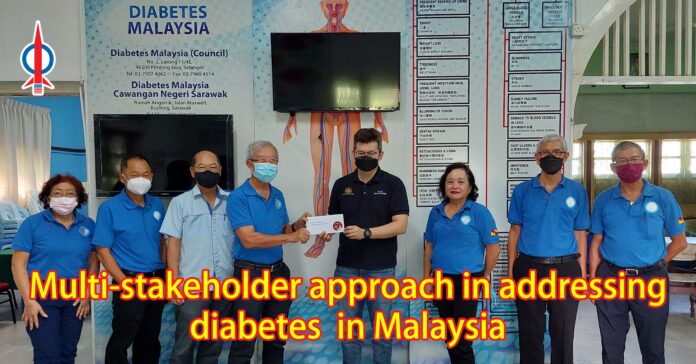Media Statement By Kelvin Yii:
Recently, i paid a courtesy visit to Diabetes Malaysia Kuching that is located along Jln Maxwell to better understand their activities and programmes to help curb this disease.
I also allocated a some allocations to the society for their expenses and will continue to support upcoming activities including Diabetes Camp and other activities to help patients adjust their lifestyle and be more compliant to what is needed to manage the condition.
Both the Federal Government must increase efforts and campaigns to counter the rising incidence of diabetes in our country, including here in Sarawak. Covid-19 has highlight the importance of this issue as well as exposed the danger of patients with Non-Communicable Disease(NCDs) such as Diabetes as up to 88% of death are among those with NCDs.
Based on the National Health and Morbidity Survey 2019, there are approximately 3.9 million Malaysians living with diabetes3. The prevalence rate has risen from 13.4% in 2015 to 18.3% in 2019. That is equivalent to 1 in 5 adults in the country, giving Malaysia the title of “Sweetest Nation in Asia”.
Recent years, the numbers are estimated to be more, with national prevalence up to 21% and Sarawak up to around 18-19%. Such numbers are continuing to increase and experts estimate that seven million Malaysian adults are likely to have diabetes by 2025, a worrying trend that will see diabetes prevalence of 31.3% for adults aged 18 years and above.
Diabetes causes a range of severe complications such as amputation, heart complications, kidney failure and nerve damage.
More has to be done to raise public awareness on this important topic to try nip the problem in the bud.In 2021, the first-ever Malaysian Diabetes Index (MDI) reveals that Malaysians may not fully understand diabetes and its resultant health complications
More than half (52%) of respondents revealed that they do not know that diabetes cannot be cured, while 51% think that diabetes is not difficult to manage. What’s more startling is that about 1 in 3 respondents (37%) with diabetes do not know what the abnormal blood sugar level readings are.
With the limited awareness levels on diabetes, more must be done to increase awareness of the seriousness of this issue.
Diabetes itself could be the silent killer among our population as it affects every part of our bodies from head to toe. It does not only have cost towards our bodies but also economic cost with government spending an upward of few billions to treat diabetic patients on a yearly basis.
That is why, more must be done to educate the public that diabetes is not just about sugar alone and that managing blood sugar levels solely will not prevent other related health complications.
This includes empowering patients to improve adherence to therapy and increasing awareness of healthy living and encouraging lifestyle changes
The Ministry of Health must continue to develop policies to promote and enforce healthier lifestyles including collaborating with the Education Ministry to bring such campaigns to school and start educating them on healthy diet and lifestyle when they are young as it is affecting more and more young people. Better food options should be provided at school canteens to encourage healthy lifestyle among children.
This is indeed an urgent issue which requires a whole of nation approach including, involving a consortium of public and private players. Governments, hospitals, payors, pharmaceutical companies, medical-device companies, data-analytics organizations, academic and research institutions, media, consumer associations, medical associations, and many others could be involved.
Australia’s diabetes-management program included close to 20 organizations. Switzerland’s QualiCCare project, also followed a multistakeholder consortium approach that included the Department of Health, patient organizations, physician associations, payors, and outside experts.
Malaysia could consider pursuing such a multistakeholder approach as it begins to implement its diabetes-management program.
Then, a well-executed central agency could coordinate and accelerate implementation of national-level initiatives, manage resource allocation, ensure financial discipline, and improve accountability, as well as track, monitor, and communicate progress among various stakeholders.
Chronic, long-term conditions such as diabetes are causing an increasing number of deaths, rising healthcare costs, and GDP losses.
That is why it is important to take appropriate and timely steps to address the country’s diabetes challenge could have a big impact on Malaysia health system and economy for years to come.
Dr Kelvin Yii Lee Wuen
MP Bandar Kuching
DAPSY National Chief










